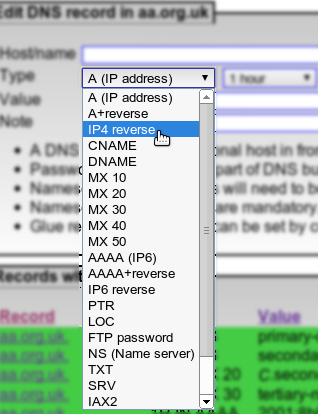Domains:DNS Types: Difference between revisions
| (28 intermediate revisions by 3 users not shown) | |||
| Line 1: | Line 1: | ||
[[File:Couk.png|link=:Category:Domains]] |
<indicator name="Configuring">[[File:Couk.png|link=:Category:Domains||Back up to the Domains Category]]</indicator> |
||
Our control pages let you manage the DNS for your domains. |
Our control pages let you manage the DNS for your domains. |
||
| Line 29: | Line 29: | ||
*DS |
*DS |
||
=Notes on specific record types= |
|||
==A+Reverse, AAAA+Reverse== |
|||
The A and AAAA reverse types are a special case, we use these to create PTR records automatically |
The A and AAAA reverse types are a special case, we use these to create PTR records automatically |
||
==LOC / Location== |
|||
The Size, Horizontal Precision, and Vertical Precision fields are expressed as a number from 0-9 and then 0-9 zeros. |
|||
For example, 30 is valid, but 25 is not. The acceptable values are: |
|||
0, 1, 2, 3, 4, 5, 6, 7, 8, 9, 10, 20, 30, 40, 50, 60, 70, 80, 90, 100, 200, 300, 400, 500 etc |
|||
==FTP== |
|||
The FTP Password is nothing to do with DNS, instead it sets the password on the domain if we are providing web services. |
The FTP Password is nothing to do with DNS, instead it sets the password on the domain if we are providing web services. |
||
| ⚫ | |||
| ⚫ | |||
==Long txt Records (over 256 Characters)== |
|||
Value: "part1" "part2" "part3" |
|||
| ⚫ | |||
Value: "long part 1.....200 characters..." "long part 2..... 200 characters..." "long part 3..... 200 characters..." |
|||
| ⚫ | |||
This is useful for long txt records, such as DKIM data |
This is useful for long txt records, such as DKIM data, for example: |
||
| ⚫ | |||
You can include a quote with: \" |
You can include a quote with: \" |
||
== |
==SRV Records== |
||
The format of the 'host' part of a SRV record is: |
|||
<ncl style=bullet maxdepth=1 headings=bullet headstart=2 showcats=1 showarts=1>Category:DNS</ncl> |
|||
_service._protocol.name |
|||
The format of the 'value' of an srv record would be in the format of: |
|||
priority weight port host |
|||
More information on [http://en.wikipedia.org/wiki/SRV_record Wikipedia] |
|||
===Examples=== |
|||
[[File:Srv.png|none|frame|The srv record relating to a Microsoft Exchange service]] |
|||
[[File:Srv-voiceless.png|none|frame|The srv record used for the AAISP SIP Service, pointing to two possible hosts]] |
|||
You can test your SRV record using 'dig' or 'nslookup' on the command line, e.g.: |
|||
$ dig +short srv _sip._udp.pbx.example.com |
|||
$ nslookup -type=srv _sip._udp.pbx.example.com |
|||
| ⚫ | |||
We will point out common problems and errors if invalid records are created. In this case, we'll highlight the record in red and will add a note with details. |
|||
[[File:Dns-error-1.png]] [[File:Dns-error-2.png]] |
|||
==Error: TXT field too long, add quotes== |
|||
Sometimes you may have an error if you try adding a record that is longer than 256 characters. |
|||
In this case, split your record in to smaller sections and quote them inside speech marks. |
|||
[[Category:DNS]] |
[[Category:DNS]] |
||
[[Category:Domains]] |
|||
Latest revision as of 14:32, 23 September 2025
Our control pages let you manage the DNS for your domains.
There are various type of DNS records that you can add

- A (IP address)
- A+reverse
- CNAME
- DNAME
- MX 10
- MX 20
- MX 30
- MX 40
- MX 50
- AAAA (IP6)
- AAAA+reverse
- PTR
- LOC
- FTP password
- NS (Name server)
- TXT
- SRV
- IAX2
- H.323
- SIP
- DS
Notes on specific record types
A+Reverse, AAAA+Reverse
The A and AAAA reverse types are a special case, we use these to create PTR records automatically
LOC / Location
The Size, Horizontal Precision, and Vertical Precision fields are expressed as a number from 0-9 and then 0-9 zeros.
For example, 30 is valid, but 25 is not. The acceptable values are:
0, 1, 2, 3, 4, 5, 6, 7, 8, 9, 10, 20, 30, 40, 50, 60, 70, 80, 90, 100, 200, 300, 400, 500 etc
FTP
The FTP Password is nothing to do with DNS, instead it sets the password on the domain if we are providing web services.
Long txt Records (over 256 Characters)
txt records are a max of 255 characters in DNS. If you need to have longer than 255 characters, then on the control page you can quote separate sections so that each quotes section is less than 256 characters long, for example:
Value: "long part 1.....200 characters..." "long part 2..... 200 characters..." "long part 3..... 200 characters..."
This is useful for long txt records, such as DKIM data, for example:
You can include a quote with: \"
SRV Records
The format of the 'host' part of a SRV record is:
_service._protocol.name
The format of the 'value' of an srv record would be in the format of:
priority weight port host
More information on Wikipedia
Examples


You can test your SRV record using 'dig' or 'nslookup' on the command line, e.g.:
$ dig +short srv _sip._udp.pbx.example.com $ nslookup -type=srv _sip._udp.pbx.example.com
DNS Records with Errors
We will point out common problems and errors if invalid records are created. In this case, we'll highlight the record in red and will add a note with details.
Error: TXT field too long, add quotes
Sometimes you may have an error if you try adding a record that is longer than 256 characters.
In this case, split your record in to smaller sections and quote them inside speech marks.



